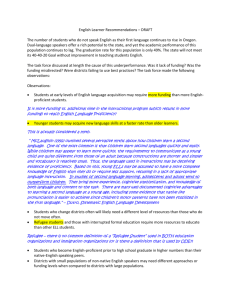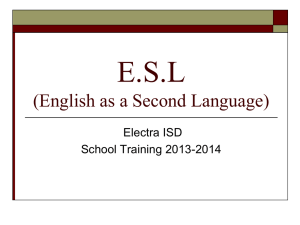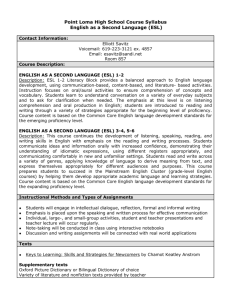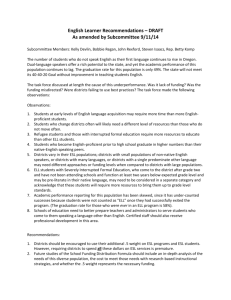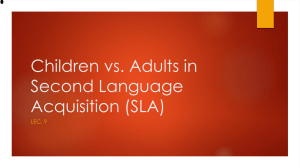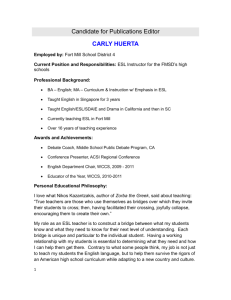ELL Subcommittee Minutes 9-11-14
advertisement
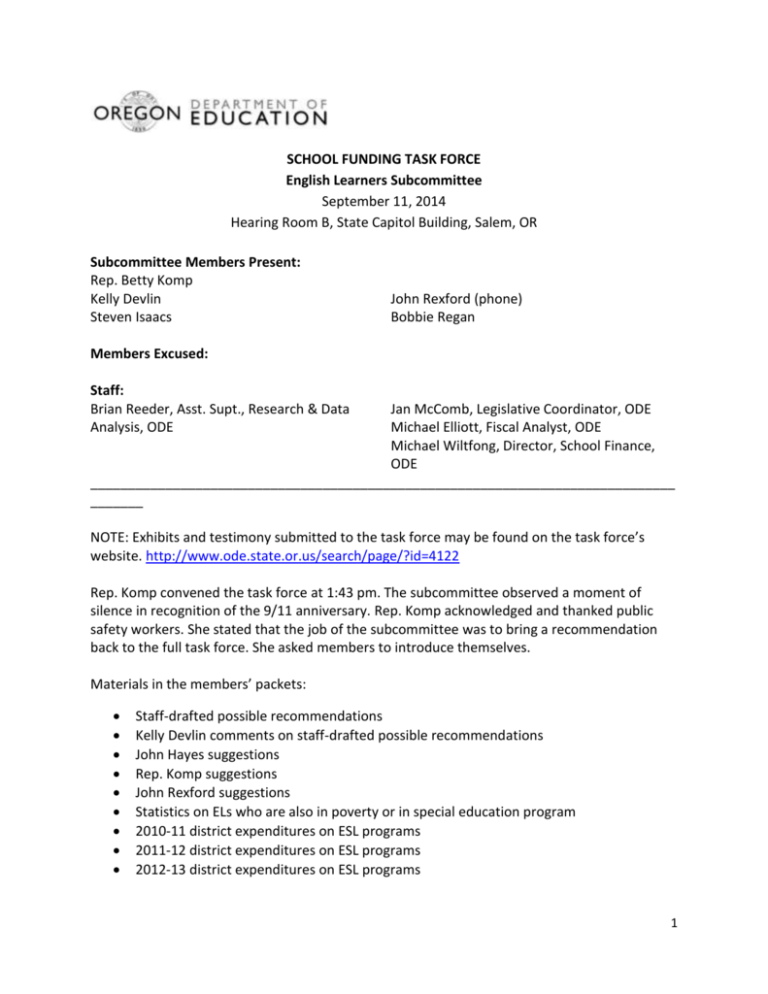
SCHOOL FUNDING TASK FORCE English Learners Subcommittee September 11, 2014 Hearing Room B, State Capitol Building, Salem, OR Subcommittee Members Present: Rep. Betty Komp Kelly Devlin Steven Isaacs John Rexford (phone) Bobbie Regan Members Excused: Staff: Brian Reeder, Asst. Supt., Research & Data Analysis, ODE Jan McComb, Legislative Coordinator, ODE Michael Elliott, Fiscal Analyst, ODE Michael Wiltfong, Director, School Finance, ODE ______________________________________________________________________________ _______ NOTE: Exhibits and testimony submitted to the task force may be found on the task force’s website. http://www.ode.state.or.us/search/page/?id=4122 Rep. Komp convened the task force at 1:43 pm. The subcommittee observed a moment of silence in recognition of the 9/11 anniversary. Rep. Komp acknowledged and thanked public safety workers. She stated that the job of the subcommittee was to bring a recommendation back to the full task force. She asked members to introduce themselves. Materials in the members’ packets: Staff-drafted possible recommendations Kelly Devlin comments on staff-drafted possible recommendations John Hayes suggestions Rep. Komp suggestions John Rexford suggestions Statistics on ELs who are also in poverty or in special education program 2010-11 district expenditures on ESL programs 2011-12 district expenditures on ESL programs 2012-13 district expenditures on ESL programs 1 Rexford stated that the expenditure data suggested that the accounting system was not as finegrained as needed. Districts may be misreporting—he suspected that most districts are spending about 95% of their additional ESL weight on ESL programs. . Discussion: Amount of ESL spending. In 2012-13, 87.6% was spent on ESL programs. 2010-11 it was 92%. How districts report their ESL spending. Whether districts needed training on coding activities for ESL. Whether ODE could provide targeted help for districts that appeared to be miscoding. Whether younger students acquired language skills at a faster rate. Definition of “refugee.” Schools don’t collect refugee status. Whether summer school should be a recommendation or whether the focus should be on the core education program. The intersection of poverty and ESL. Students who stay in ESL programs for a long time are often special education students. The many factors that influence ESL; there needs to be more research. English Language Learners with Severely Interrupted Formal Education (SIFE) and whether that should be a new funding category. Whether to include ever-ELL students in statistics in recommendations. Importance of accurate data and sound research. Falling behind for immigrant students, compounded over the years. Importance of adequate teacher preparation. Kids in multiple categories; complexities in serving them. Students with SIFE may deserve their own category and weighting; state does not currently collect this information and some districts do not. Overall, the report should say that this group did not have funding nor time for research and the task force is recommending a fully-funded task force and staff to analyze data. Recommendations 1. Districts should be encouraged to use their additional .5 weight on ESL programs and ESL students. However, requiring districts to spend these dollars on ESL services is premature. 2. Future studies of the School Funding Distribution Formula should include an in-depth analysis of the needs of this diverse population, the cost to meet those needs with researchbased instructional strategies, and whether the .5 weight represents the necessary funding. 3. If a weighting change is proposed in the future, the subcommittee recommends that additional money be added to the State School Fund to avoid resource shifting and helping one group of students at the expense of another. 2 4. Any changes in the ESL formula should be evaluated with respect to the change’s effect on other student populations. 5. Poverty is an intrinsic factor in this population; no ESL program will be entirely successful without addressing issues that arise due to poverty. The in-depth study recommended by the task force should evaluate whether students who are both ELL and in poverty require a different weight that students who ELL but not in poverty. 6. The Department of Education should work with school districts to assure that the expenditure data for ESL programs is being reported accurately. The full task force next meets September 26. ADJOURN Chair Devlin adjourned the committee at 2:56 pm. 3

